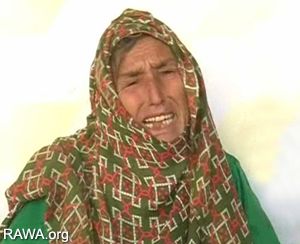By ALISA TANG
BUNYAT, Afghanistan -- Fatama's husband left home one night to smuggle drugs from their mud-thatch border village into Iran. The next morning, her brother-in-law gave her the news: Her husband had been killed.
Fatama joined hundreds of other bereaved women in Bunyat, known locally as a "widows village" because so many of its men have died during Afghanistan's long wars, or because of a more recent plague _ the highly profitable but dangerous business of opium and heroin smuggling.
Among the 1,000 or so families who live here, there are 350 widows, village elders said.

Nov. 5, 2006: Gulsha, suffering mother of 11-year-old Sanubar who was kidnapped by warlords and then exchanged for a dog in North of Afghanistan. (RAWA photo)
Movie Clip of Gulsha | RAWA report
Fatama, who is about 30, was left to raise four children. Sometimes widows are cared for by other male relatives, but many must support themselves by weaving carpets, baking bread or doing laundry and cleaning.
The men have found a much more lucrative job.
"Most of the young people in this village smuggle drugs," one smuggler who identified himself only as Mohammad said as a village elder shook his head in disapproval, a warning to keep quiet about the village's illicit activities.
"These people are poor. There is no water here. They can't grow anything, so they have to smuggle drugs," Mohammed said, hanging out in the street with several men who also said they were traffickers.
The men said each time a smuggler crossed the border, he carried 20 to 40 pounds of high-grade, concentrated heroin. Mohammad said each delivery earned the carrier $200 a pound _ a possible profit of $8,000 a trip _ extremely good money in a country where teachers and police officers earn just $70 a month.
Across the border in Iran, the street price of heroin is about $5,800 a pound, according to the U.N. Office on Drugs and Crime's latest World Drug Report. That figure jumps to $46,300 a pound in Britain and to $94,300 in the United States.
Bunyat is an impoverished village in the western province of Herat, about 25 miles from the main road across a wild, wind-swept desert plateau.
There are no industries or agriculture, and in desperation the men have resorted to drugs, a $3.1 billion industry in poppy-rich Afghanistan, which produces enough opium to make 90 percent of the world's heroin. A bumper crop is again expected this year in nearby Helmand province, the world's largest opium-producing region.
Most of the men say three or four smugglers are killed crossing the border every few months, some in clashes with Iranian police, others by land mines. Mohammad put the death rate higher _ three or four each month.
The U.S. State Department says most opiates leaving Afghanistan pass "through Iran to consumers in Iran itself, Russia and Europe."
Iran says it suffers mightily from Afghanistan's drugs and does its best to control the border between the countries, often a dangerous struggle. In the past decade or so, about 3,000 Iranian policemen and security officers have been killed by smugglers, said Mohammad R. Bahrami, Iran's ambassador to Afghanistan.
"Killing the smugglers is not our policy," Bahrami said, saying Iranian authorities arrest, jail and prosecute them as best they can. "If the smugglers start to fight Iranian police, naturally we defend."
Jamila, who like many Afghans does not know her exact age but looks to be in her 20s, went to see her husband's body near the border after he was killed by a land mine while smuggling opium. She said his head and hands were covered in blood.
Years ago, after they were engaged, she forbid him from drug-running.
"I told him, if you go, you will be killed. After three or four months, he started going back to the border areas. He went secretly," she said.
"The Taliban has become an alternative source of employment, recruiting the jobless as foot soldiers in the insurgency," US-based Center for Strategic and International Studies said in a recent report.
The drug widows represent only a portion of the women left behind in Bunyat. Other husbands were killed in war.
In one house, six widows live together _ an elderly woman and her five daughters-in-law, who now survive doing farmwork.
Nakzi, who walks with a limp and hunched back and whose speech was barely comprehensible because of partial paralysis of her face, is the head of the household. Senility has drained her memory. When asked how her sons died, she responded feebly: "They went to Iran, and they returned to Afghanistan."
At Fatama's house nearby, dozens of children ran about in the courtyard, on the rooftops and peeked out of windows. Amir Khan, head of the village council of elders, swatted at them, yelling, "Buro!" or "Shoo!" Still, chaos reigned.
Khan bemoaned the villagers' hard lives and pleaded for international aid.
"The lives of most of these families is very bad, and every day it goes from bad to worse," he said amid the din of children. "These people live like wild animals. Most of these women and children living without anyone in charge of their families will die, and no one will ask about them."



